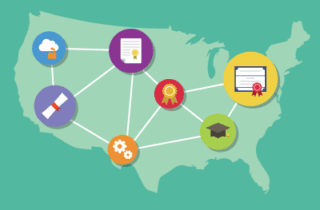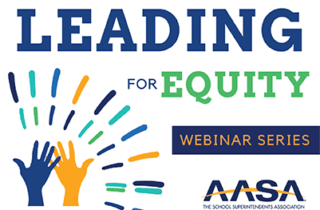Presented by Dr. David Schuler, Superintendent, High School District 214 (IL); Vanessa Buitrago, Principal, School of Engineering and Sciences, Sacramento City Unified School District (CA); and Jennifer Wells, Social-Emotional Learning and Student Development Coordinator, Round Lake Area School District (IL)
Moderated by Jessica Berlinski, Director of K-12, Ripple Effects; and Takeru Nagayoshi, Panorama Education Professional Learning Director of Community Events and 2020 Massachusetts Teacher of the Year
Presented by Rosa Redonnett, Associate Vice Chancellor for Student Success and Credential Attainment, University of Maine System; Dr. Jennifer Carroll, Professional Learning Lead, Kentucky Valley Educational Cooperative; and Antonio Mabiala, Adult Learner and Micro-Credentials Earner
Featuring Frederick Joseph, author and activist; Jelani Alladin, artist; and David Cox, Creative Marketing Writer/Producer at HBO. Moderated by Michelle Luhtala, a school librarian.
Presented by Jasmine Lamitte, Director of Mental Health & Support Services, KIPP SoCal (CA); and Lydia Lower, Director of Educational Services, Mariposa County Unified School District and Mariposa County Office of Education (CA)
Moderated by Jessica Berlinski, Director of K-12, Ripple Effects
Presented by Dr. Julie Evans, Chief Executive Officer, Project Tomorrow
When something dramatic happens, like releasing student achievement scores, there’s often an outcry over educational inequities, and there are statements and calls to action to do better. Most of the time, though, the initial energy dissipates, and nothing changes. During an edWebinar hosted by AASA, The School Superintendents Association and AASA’s Leadership Network, John Krownapple and Floyd Cobb, Ph.D., authors of Belonging Through a Culture of Dignity: The Keys to Successful Equity Implementation, discussed why belonging and dignity are just as important as access and opportunity when it comes to educational equity.
The COVID-19 pandemic exposed and, in many ways, worsened the digital divide and other inequitable aspects of America’s education system. However, it also created opportunities to develop more equitable outcomes, based on the widespread switch to digital learning experiences and new education models.
In a recent edWebinar, sponsored by Scholastic Digital Solutions, the presenters discussed the reality of racial violence and inequity that students of color face and what we as educators and administrators can do to confront it rather than perpetuate it. They identified racial violence as violence incurred by students of color that can be overt and covert, taken for granted, an act of invisibilization, or the erasure of students’ identities and realities.
Education is just different than it was pre-pandemic—many school leaders think it shouldn’t go back to the way it was before when schools used systems developed in the 20th century. But that doesn’t mean even more changes aren’t needed. In a recent edWebinar, hosted by AASA, The School Superintendents Association and AASA’s Leadership Network, the presenters discussed the findings of the AASA Learning 2025 National Commission and the need to get more students engaged in their own educational experience.
Presented by Veronica Crespin-Palmer, Co-Founder and CEO, RISE Colorado; Dr. Gudiel Crosthwaite, Superintendent, Lynwood Unified School District (CA); and Anpao Duta Flying Earth, Senior Advisor, Native American Community Academy (NM)
Moderated by Kimberly Smith, Executive Director of the League of Innovative Schools and Center for Inclusive Innovation, Digital Promise









